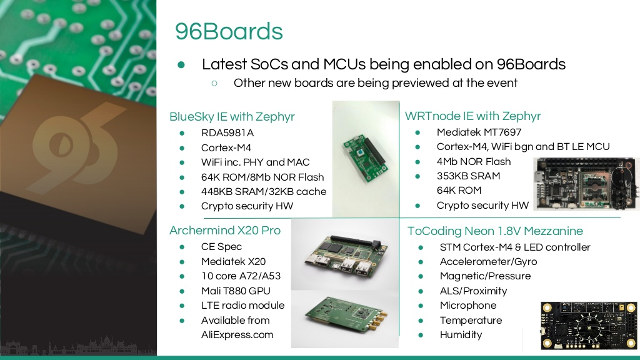Linaro Connect Budapest 2017 is taking place this week in Hungary, and during George Grey – Linaro CEO – keynote, he provided a status updates for the Linaro group, addressed some of Linaro’s criticisms from members and the community, and unveiled two upcoming boards compliant with 96Boards IoT edition both running Zephyr OS, and adding to BLE Carbon board announced last year.

The first board is BlueSky IE board with the following key specifications:
- SoC – RDA Micro RDA5981A ARM Cortex-M4 Wireless MCU with 64KB ROM, and 32KB cache
- System Memory – 485KB SRAM. It’s unclear if that’s only the on-chip SRAM, and there’s also some external PSRAM added.
- Storage – 8Mb NOR flash 802.11 b / g / n HT20 / 40 mode
- Connectivity – 802.11 b/g/n WiFi with support for HT20 / 40 modes
- Crypto security hardware
The second board is WRTnode IE:
- SoC – Mediatek MT7697 ARM Cortex-M4 wireless MCU @ up to 192MHz with 64KB ROM, 353 KB SRAM
- Storage – 4Mb NOR flash
- Connectivity – 802.11 b/g/n WiFi and Bluetooth 4.2 LE
- Crypto security hardware
Neither boards are available now, and Linaro and their members must still be working on them before the launch. There’s currently very little information about RDA5981(A) MCU except on some Chinese websites, but you’ll find many more resources for Mediatek MT7697. Mr Grey also demo’ed Orange Pi i96 board announced last year with an Ubuntu distribution developed by Shenzhen Xunlong Software.
Linaro also announced four new members with Acer joining the Linaro IoT and Embedded (LITE) Group, Guizhou Huaxintong Semiconductor Technology Co., Ltd (HXT Semiconductor) & Fujitsu Limited coming to the Linaro Enterprise Group (LEG), with the latter also joining as founding member of the LEG High Performance Computing Special Interest Group (HPC SIG), and Google joined as a Club member.
You might be interested in watching the keynote with all those announcements, and to be more up-to-date with Linaro’s progress.

If you are in a rush, you may prefer flicking through the keynote presentation slides instead.

Jean-Luc started CNX Software in 2010 as a part-time endeavor, before quitting his job as a software engineering manager, and starting to write daily news, and reviews full time later in 2011.
Support CNX Software! Donate via cryptocurrencies, become a Patron on Patreon, or purchase goods on Amazon or Aliexpress





Thanks for the slides, Jean-Luc. Slide 21, in particular, hits all the ARM developer’s nails on their heads. I’ve spent a good amount of my spare time in seeking those precise ‘key development enablers’ though the years. And they’ve always been ‘one step away’, ‘just around the corner’. Hopefully those start appearing – enthusiast-segment hw vendors like HardKernel and Solid-Run, and surprisingly enough, consumer-segment hw vendors like Samsung and Acer (via chromebooks), are actually all converging to that key moment in the history of ARM where app developers can be, well, app developers, and not kernel/driver/devtree tinkerers & hackers. Ideally, I want to be able to get a new hw, install a suitable distro, clone my repos and continue from where I left on the prev device*. Surprisingly (or not), organisations like 96boards largely missed that.
* My recent experiences with ODROID and BQ’s Ubuntu tablet have been oh-so-near to that, that I could literally taste it. I’m impatient to receive macchiatobin and finally proclaim the advent of developer’s ARM pc ; )
Perhaps Nanopi.org should do a vastly updated NanoPi WiFi Board ( no longer produced ) guess the neo and neo air do the same now.
is that really just 1 megabit of NOR? that’s pretty lean.
@cnxsoft
wait, isn’t Orange Pi i96 the same thing as Orange Pi 2G-IOT? Which one is going to be released?
OrangePi i96 is more or less the same as OPi 2G-IOT while the former features RTL8189FTV Wi-Fi (pretty good choice BTW, I finished today some tests with a few cheap Wi-Fi equipped SBC in this one was the clear winner) and the latter 2G capabilities (SIM card slot).
Thanks for the info! Xunlong NEVER posts anything.
Do you know when the I96 is going to be released? What Linux kernel version does it use
3.10.62?
@tkaiser , @cnxsoft
For instance would you know which one performs better: RTL8189FTV vs RTL8189ETV ?
@parrotgeek1
No idea about when Xunlong will release what but regarding kernel version I would believe you already spotted it correctly: 3.10.62 (if that’s the version some Android smartphone powered by this SoC shows then I highly doubt this will ever change since ‘port and forget’ only available ‘development style’ in this price segment)
@@lex
I’ve not a single RTL8189ETV device here but I would assume they perform identical as RTL8189FTV since RealTek engineers aren’t morons and re-design their chips every now and then. And based on current testing I believe environmental conditions (like antenna, shielding, position of ICs on the PCB) might influence performance more than individual chipset used (when they’re 1T1R and 2.4Ghz only maximum performance in ideal conditions is both predictable and irrelevant — since then you’re so close to the AP that you could simply use a wired connection instead — and over larger distances type/quality of antenna and TX power settings become more important)
Interestingly, it wasn’t a port and forget approach, from what I can see! This chip launched with 4.2.2 and Linux 3.4.0, was updated to 3.4.67, and now KitKat with 3.10!